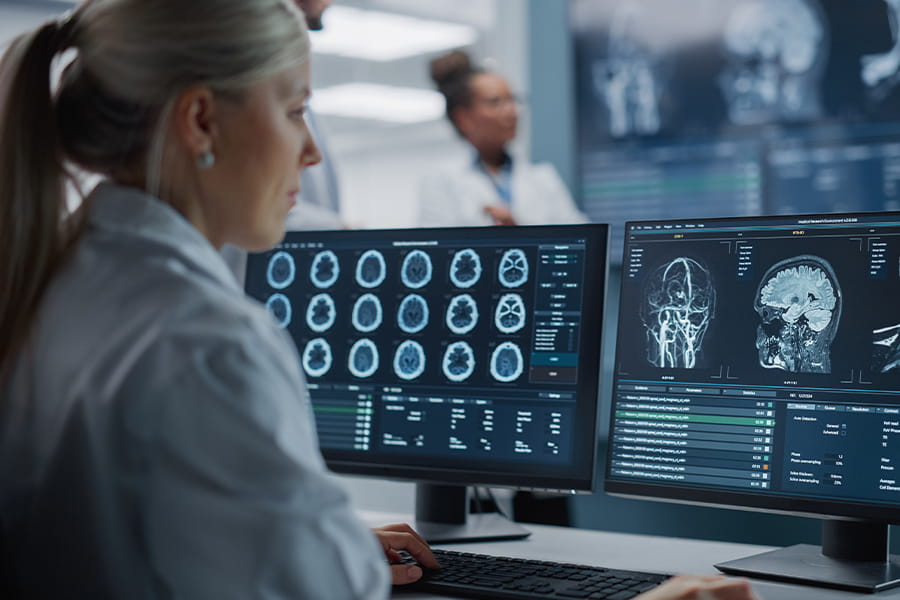Get Started. Contact Us
Baptist Health provides safe and efficient inpatient and outpatient diagnostic imaging for adults and for children (imaging for children available at only some locations). As one of the area’s most advanced diagnostic imaging centers, our services are fully integrated with our excellent medical care. In this way, we work together to detect the earliest signs of disease or injury and provide expert treatment.
Advanced Imaging Services
Our registered technologists and fellowship-trained radiologists use advanced technology to provide high-quality imaging services to diagnose, monitor and treat illnesses and injuries. Comprehensive imaging includes:
CT scan: This fast imaging test uses X-rays and computers to create detailed images of the organs, bones, soft tissues and blood vessels. Learn more about Baptist Health's lung CT screenings.
Magnetic resonance imaging (MRI): An MRI uses a large magnet, radio waves and a computer to produce pictures of organs and structures in the body and can often show problems not seen by other imaging methods.
Nuclear medicine: During a nuclear medicine test, a small amount of radioactive substance is injected into the bloodstream, inhaled or swallowed. The substance releases energy and cameras outside the body detect the energy. The cameras and a computer create detailed images of the inside of the body to help identify medical conditions in the earliest stages. Nuclear medicine can also be used to treat cancer and other medical conditions.
Diagnostic ultrasound: An ultrasound uses high frequency sound waves to produce images of the structures inside the body. Ultrasound can safely examine a baby in a pregnant woman, help to diagnose pain, infection or medical conditions in children and adults.
Bone densitometry: This specialized X-ray helps diagnose osteoporosis or determine fracture risk.
Positron emission tomography (PET) scan: During a PET scan, a small amount of radioactive material is injected. The organs and tissues in the body absorb the material and when detected by the PET scanner, show how the organs and tissues work.
3-D mammography: This imaging test uses advanced technology to take multiple X-rays of breast tissue to create a 3-D picture using our 3D Tomosynthesis. This technology gives a clearer view of breast masses and makes it easier to detect breast cancer earlier.
Cardiac catheterization: During this test, a long, thin flexible tube is threaded through a blood vessel in the arm or groin and to the heart. Contrast material is injected through the tube and a type of X-ray video is taken to show how the heart functions and to look for heart blockages.
Routine radiography: Diagnostic X-rays, or routine radiography, focus a small amount of radiation on a specific area of the body. An image is produced on a film or on a computer display. Sometimes a special dye is injected before the X-ray to help show how blood vessels or organs function or the condition of joints.
Arteriograms and venograms:These imaging tests use X-rays to see the condition of veins or arteries and to locate blockages or blood clots.
Holter monitors and electrocardiogram (EKG) testing: An EKG measures the electrical activity of the heart and can help determine if parts of the heart are enlarged, overworked or damaged. The heart’s electrical currents are detected by 12 to 15 electrodes that are attached to the arms, legs and chest via sticky tape. A Holter monitor is a portable EKG device that continuously records the heart’s rhythms and is worn for 24 to 48 hours during normal activity.
Vascular studies: These studies use high frequency sound waves to check the blood flow in the veins and arteries.
With You Every Step of the Way
If you need diagnostic imaging, you can count on the compassionate and skilled team at Baptist Health to be with you every step of the way. Our staff includes fellowship-trained radiologists, radiologic technologists, ultrasonographers and nuclear medicine technologists. From helping you prepare for your tests to listening carefully to your questions and clearly explaining everything you need to know, you’ll appreciate our careful attention and support.
Our Team
The radiology team at Baptist Health works together to provide the highest level of care for every patient. Each team member is highly trained in the use of our advanced imaging technologies and in meeting the individual needs of our patients.
Preparing for Your Test
Preparing for your imaging test is an important way to assure the best results. We will carefully explain the test to you so you understand what you will feel and what will happen. Some imaging tests require no special preparation, while others may require that you avoid eating or drinking for a certain period prior to the test, require you inhale or swallow a special dye or tracking substance, or require you to drink a large volume of water or other liquid. We will provide full instructions for you to follow prior to your test.
Comforts and Convenience
We strive to make every part of your diagnostic imaging experience as pleasant and convenient as possible. Appointments are offered to help fit your schedule. Plus, all imaging exams are digital. That means they become part of your medical record and can be recalled at any time at any Baptist Health or Baptist Health affiliated location through your electronic medical record.

